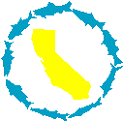CSPA |
| Your 501(c)(3) tax deductible cash donations are desperately needed if the fight for our fisheries is to continue. Read how you can donate! |
 Enter your Email address to sign up Enter your Email address to sign up for our Weekly Newsletter For Email Marketing you can trust |
More News
![]()
 CSPA Comments on Ag Discharge Program - Permits Essential to Protect Fisheries
CSPA Comments on Ag Discharge Program - Permits Essential to Protect Fisheries
by Bill Jennings, Executive Director, CSPA
June 8, 2009 -- On 5 June 09, CSPA submitted comments to the Central Valley Regional Water Quality Control Board concerning the initial draft proposals for the long-term irrigated lands regulatory program alternatives. CSPA believes individual and/or general waste discharge permits are essential for any meaningful program regulating discharges of pollutants from irrigated agriculture.
Regional Board staff, working with an advisory stakeholder workgroup, is developing a series of regulatory alternatives that will be evaluated in an Environmental Impact Report (EIR) for the long-term program to regulate waste discharges from farms. The EIR must be completed before the 2011 expiration of the present agricultural waiver program.
The irrigated lands waiver program regulates wastewater discharges from some 25,000 farms spread over 7 million acres of farmland in the Central Valley. The highly controversial waivers were adopted in 2003, renewed in 2006, and exempt irrigated agriculture from complying with routine waste discharge requirements applicable to industry, municipalities and mom-and-pop businesses. The program has abysmally failed to reduce the massive pollution of Central Valley waterways from agricultural waste discharges.
Discharges of agricultural wastes are documented as the largest source of pollution to Central Valley waterways and are responsible for polluting and impairing thousands of miles of streams, rivers and the Sacramento-San Joaquin Delta. Toxicity from agricultural pollutants, along with water exports and invasive species, have been identified by state and federal scientists as one of the principle causes for the decline of salmonid species and the catastrophic collapse of the Delta's pelagic fisheries (i.e., Delta smelt, splittail, threadfin, longfin, young-of-the-year striped bass, etc.).
CSPA and San Francisco Baykeeper are presently litigating the 2006 waiver over violations of CEQA and inconsistency with fundamental requirements of the state's Porter-Cologne Water Quality Control Act and Non-Point Source Control Policy.